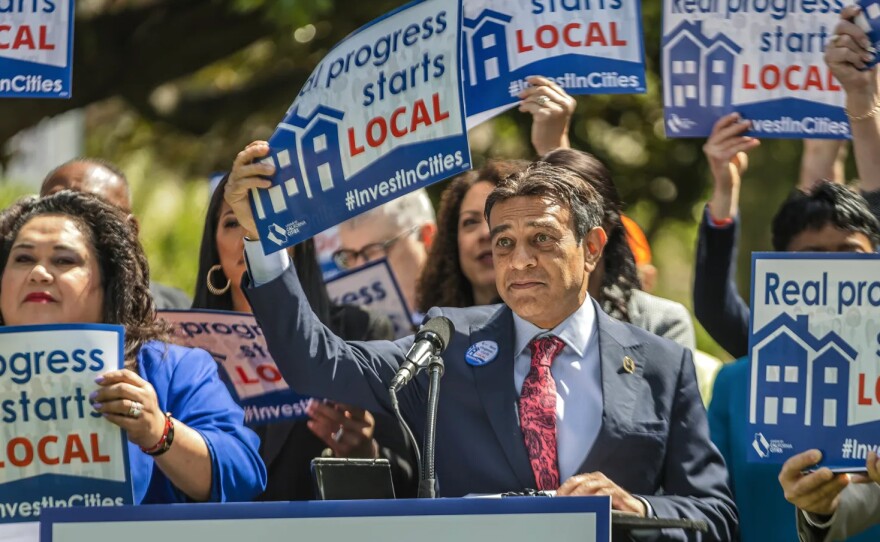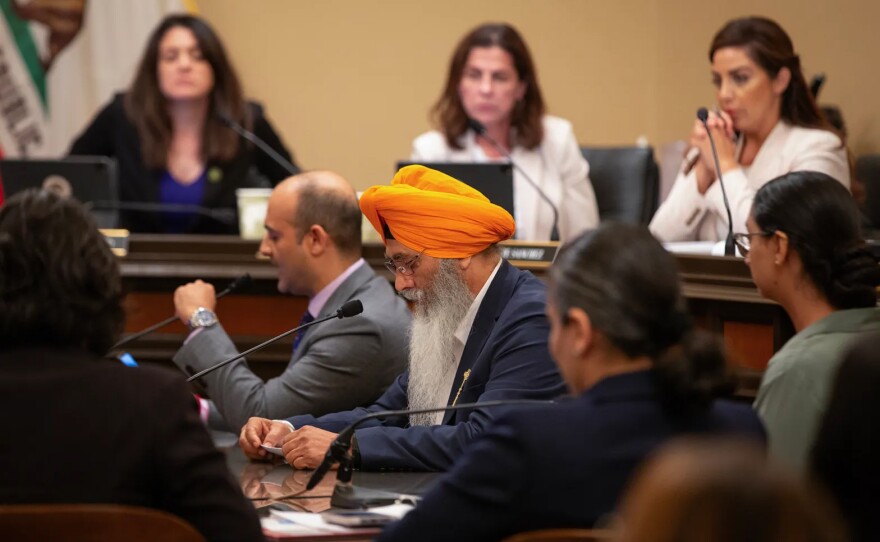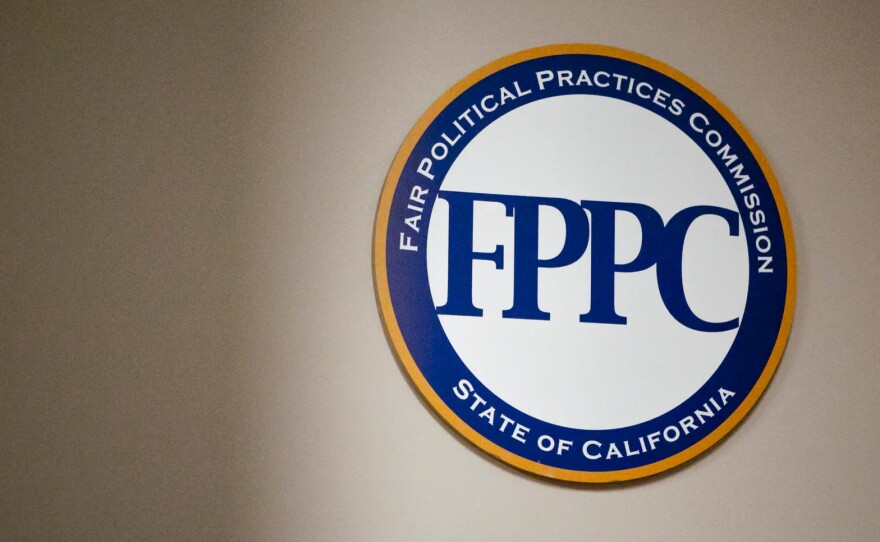The tiny Central Valley city of Farmersville reported lobbying on a contentious caste discrimination bill, even though it doesn’t have a large South Asian population. San Mateo County lobbied the state budget, plus one specific bill this session, focused on student meals, at the request of its health department. Rosemead in Los Angeles County lobbied on a stalled youth tackle football bill, at the urging of one city councilmember.
These are some of the more unusual and curious examples of one way business gets done at the state Capitol — local governments using taxpayers’ money to lobby the Legislature and state agencies, sometimes for more tax money.
According to a CalMatters analysis, local governments, water districts and transit agencies have spent nearly $24 million on lobbying the state this year, accounting for about 10% of the more than $233 million total.
Industry groups and special interests spend much more on lobbying. For instance, while the Hawaiian Gardens Casino and Chevron are the biggest lobbying spenders, at more than $5 million each, the city of Los Angeles ranked 23rd at about $1 million, just behind Vernon, a 328-person, scandal-plagued industrial city in Los Angeles County, which spent about the same but reported lobbying on “no legislation or administrative actions.”
Not all local government agencies lobby the state, but those that do tend to want to influence policies such as crime, land use, housing or water. They also seek more money from the state budget: This legislative session, cities and counties sought millions for homelessness programs, while public transit agencies wanted help covering operating costs.
And some national research shows the lobbying pays off — cities that do receive between 7% and 9% more per person in state funding than those that don’t.
Despite the benefits to some local governments and their taxpayers, the lobbying process isn’t fully transparent. There are no disclosure requirements for why a city lobbies on a particular bill or what position it’s taking. There are also no statewide rules for soliciting input from residents before deciding what bill or issue on which to lobby.
Paying for a seat at the table
State lawmakers are already supposed to look out for the needs of the cities they represent. But because legislators might have multiple cities in their district, or a city might be split among several districts, many municipalities still lobby to communicate their needs.
“California has some of the highest city lobbying rates of any state in the country,” said Julia Payson, an assistant professor of political science at UCLA who has studied municipal lobbying across the U.S.
But “it’s not an outlier by any means,” Payson said, especially given how much state money is at stake. According to the state Department of Finance, about 80% of California’s budget, including federal money the state distributes, is spent on local assistance — $362 billion of $466 billion total in all funds in 2022-23.
But by influencing how much local agencies get from the state, Payson’s research indicates this lobbying could perpetuate revenue gaps among local governments.
That city governments lobby for the attention of officials who already represent them is “puzzling,” according to research co-authored by Jaclyn Kettler, an associate political science professor at Boise State University. She noted that there’s been at least one effort, in Texas, to ban the use of taxpayer money for lobbying the state government.
“We have in the United States, the federal system of government, meaning we have multiple levels of elected officials in many areas,” she said. “We were like, this is really curious that these governments are needing to hire representation when they already have elected officials.”
The Howard Jarvis Taxpayers Association keeps an eye on the use of public funds for political advocacy. “I think most taxpayers would be very disappointed to learn the extent to which their taxpayer funds are being spent in Sacramento to lobby for higher taxes,” the group’s president, Jon Coupal, told CalMatters on Wednesday.
Local governments can take a few paths to advocacy in the state Capitol, though some employ a mixed approach. They can dispatch their elected and appointed leaders to Sacramento, hire their own in-house lobbyists, or they can join coalitions such as the League of California Cities, which spent about $3 million lobbying last session, or the California State Association of Counties, which spent $1.4 million.
There has “always been a push-pull between what is deemed a municipal responsibility and what is an issue of statewide concern,” Jason Rhine, the league’s interim advocacy director, wrote in an email.
Rhine said the group ends up tracking about two-thirds of all bills introduced, and that its policy experts monitor each bill and its potential impact. The league’s lobbying priorities are “informed entirely by our members and our board,” he said.

Or local governments can hire lobbying firms, which can be especially helpful for smaller cities to keep track of the many bills that go through the Legislature. For Tulare, a smaller, more conservative city in the Central Valley, lobbyists help give it more of a voice in the Democratic super-majority state Legislature, said City Manager Marc Mondell. It has spent nearly $32,000 this year.
“The large policy issues in any state are typically driven by the party that's in control, and by the largest metropolitan areas — so the Los Angeleses, the San Franciscos, the Sacramentos,” he said. “A 70,000-person city like Tulare is not going to have much of a voice. So one of the ways you try to amplify that voice is by having a lobbyist.”
So far in 2023, the city of Los Angeles reported spending more than $1 million on lobbying, though that doesn’t include lobbying by some departments such as the city attorney. San Francisco Mayor London Breed’s office reported spending $184,000 on lobbyists, though the Board of Supervisors reported no spending. That may reflect that two of the current legislators representing San Francisco were recently supervisors. Sacramento reported more than $450,000.
Some local officials believe that hiring lobbyists gives them more detailed input on bills in a way that just issuing a position statement doesn’t.
“They can not only speak intelligently on the issues, but, if they have an opportunity, they can also reiterate a position that we may have taken on a piece of legislation and just sort of remind our legislators that we need their help, and we're watching their voting record,” said Joe Calabrigo, town manager in Danville in the East Bay.
Some cities lobby specifically on bills authored by lawmakers who represent their districts, at times at their prompting, if the issues fit their framework. Danville backed Assemblymember Rebecca Bauer-Kahan’s bills on mental health, such as the 988 suicide and crisis lifeline bill signed into law last year.
“If we expect the Assemblymember to hear us if we have issues or concerns with any bill, we also want to be there to back her up when she's doing something that we think is positive,” he said. “When you have that kind of a working relationship back and forth with your legislators, it's a two-way street.”
Still, if their leaders already have good working relationships with legislators, a city may want to avoid the expense of hiring lobbyists. “It’s kind of like a gamble … it’s going to work better in some years than others,” Payson said.
A fuzzy picture
The full picture of what local governments lobby on isn’t known because they’re only required to file reports with the Secretary of State’s office each quarter when they have contracted with a lobbying firm. Cities also have to report salaries of in-house lobbyists who spend at least one-third of their time directly advocating for regulation or legislation.
And aside from which bills were lobbied on the most and how much was spent, the filings that are required don’t offer a very clear picture — including whether the cities support or oppose the bills.
Take Senate Bill 403, the caste discrimination bill by Sen. Aisha Wahab, a Democrat from Fremont. According to the reports, the bill is being lobbied on by the Central Valley cities of Farmersville, Kingsburg, Reedley, Tulare, Turlock and Soledad, as well as Morro Bay on the Central Coast.
All seven cities are clients of Townsend Public Affairs, a self-described top 10 lobbying firm that represents about 70 local agencies.
Asked why they had chosen to lobby on the caste bill — among other bills on their Townsend list that included land use, water protections and government operations — officials in four cities that responded did not know. They checked, and reported back the same information: If the city asks about a bill and what its impacts might be, that gets reported.

But that’s counter to instructions from the state’s Fair Political Practices Commission, which states that lobbyist employers must report “the legislative bills and state agency administrative actions which you ‘actively’ influenced or attempted to influence, or your lobbyist or any lobbying firm with which you contract ‘actively’ influenced or attempted to influence on your behalf during the calendar quarter.”
The instructions explicitly define what “actively’ lobbied” means, and say not to list bills “which are only being watched or monitored, or those which you have not attempted to influence during the reporting period.”
Townsend did not respond to repeated requests for comment. On its website, it promises a “comprehensive approach” of tracking bills, building relationships with legislators and agency officials and developing a strategy. “Without a strong presence and legislative agenda in Sacramento, it is difficult to make your voice heard,” the firm says.
But the caste discrimination bill isn’t the only one that seemed outside a local government's purview and priorities:
- A bill on reporting uncounted ballots by the San Bernardino County Sheriff’s Department, which they said was likely due to a typo. That was also the case for the El Dorado Water Agency, which appeared to be lobbying on a bill related to homeless services staff training, but in fact was lobbying on a bill related to prescribed grazing for wildfire and forest resilience. The agency has updated its forms.
- The Central Delta Water Agency, which, according to its reports, was lobbying on bills addressing the California’s Acute Care Psychiatric Hospital loan fund, family councils for long-term care patients, how the Secretary of State manages referendums, juvenile court hearings, and sexually violent predators, as well as three bills that don’t exist this session. The agency said some bills were incorrectly carried forward from past sessions, and others were typos. It has since corrected the errors.
- The San Joaquin Valley Unified Air Pollution Control District and the South Coast Air Quality Management District appeared to be lobbying on a bill addressing legal services for undocumented minors, but, according to their websites, the lobbying efforts were for a bill with the same number from 2017. The South Bayside Waste Management Authority also appeared to be lobbying on a bill that doesn’t exist this session, but according to their website, is for a bill from 2022.
- The San Gabriel Basin Water Quality Authority said it is not lobbying on SB 485, a bill on election worker protections, and that it was an old bill.
- The Santa Ana Watershed Project Authority did not know why the agency reported lobbying on a local redistricting bill. The Sonoma County Water Agency did not respond to questions about why it is lobbying on three bills that don’t exist this session.
The state’s Franchise Tax Board, which is responsible for some oversight of lobbying spending, has fallen short on enforcement of auditing lobbying reports. The board has said it needs more staff to keep up and is seeking more money.

The lack of audits is problematic, said Richard Miadich, chairperson of the Fair Political Practices Commission, which enforces laws governing campaign finance and lobbying.
Transparency carries additional weight when it’s local governments and agencies doing the lobbying with taxpayer money, he said.
“These local governments feel compelled to do it because of the complexity of the issues that are being considered by the state Legislature.… So it's not surprising that they are leveraging the expertise of both in-house and outside lobbying firms to try and have their voice be heard in the legislature,” Miadich said.
“So I don't think there's anything inherently wrong with what they're doing. I think as long as they're being transparent about it and being accurate in what they're doing … that is the most important thing from our standpoint.”
According to Miadich, issues like typos might be addressed with a warning letter to keep better records. Other violations that indicate an agency is trying to hide something would be sent to the commission’s enforcement division.
Public input is spotty
The Political Reform Act of 1974 gives cities, counties and other districts the authority to lobby the state and federal governments and individual lawmakers and officials on behalf of their constituents, but there is no statewide rule on how they disclose what they lobby on to residents, or if they have to collect any public comments.
That means the process varies by city. Some just report lobbying activity on their forms filed with the Secretary of State each quarter, while others adopt a legislative agenda each year that they discuss and vote on in a public meeting, then lobby throughout the year on bills that fit the adopted criteria. Some post legislative and lobbying activity on their websites, and might also discuss bills at public meetings.
“A 70,000-person city like Tulare is not going to have much of a voice. So one of the ways you try to amplify that voice is by having a lobbyist."
TULARE CITY MANAGER MARC MONDELL
“A 70,000-person city like Tulare is not going to have much of a voice. So one of the ways you try to amplify that voice is by having a lobbyist."
Officials from Tulare and Danville said that they don’t typically see a lot of engagement from the public on state bills.
That was far from the case on July 18 in Cupertino, though, when the City Council spent the majority of a five-hour meeting, including 90 minutes of public comment, on whether the city should take a position on the caste bill.
Despite most council members opposing the bill during the debate, they opted to pass a broader resolution that pledged to “vigorously oppose any law that could, intentionally or unintentionally, result in racial or ethnic profiling, violations of civil rights, or stigmatizing any segment of our society.”
Tina Kapoor, Cupertino’s deputy city manager, said the goal was to provide a platform for community members, whether or not it impacts the bill’s fate.
“In Cupertino, we really do pride ourselves on engagement and transparency,” she said. “We strive for that.”







